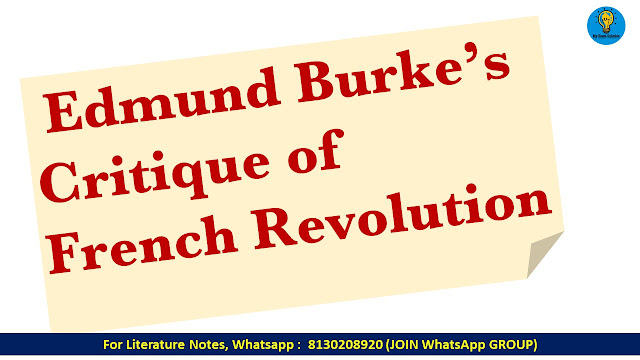Edmund Burke’s critique of the French Revolution
The French Revolution, a watershed moment in history, marked
the overthrow of the Bourbon monarchy and the rise of radical ideologies.
Edmund Burke, a prominent Irish-British statesman, philosopher, and political
thinker, offered a profound critique of the French Revolution in his work
"Reflections on the Revolution in France." This critique, presented
in 1790, provides insight into Burke's perspective on the dangers of radical
political change, the importance of tradition and gradual reform, and the
potential consequences of disregarding established societal norms. Edmund Burke’s critique of the French Revolution.
Edmund Burke (1729–1797) stands as one of the most
influential figures in the realms of politics, philosophy, and literature
during the Enlightenment period. Born in Dublin, Ireland, Burke's life and work
continue to resonate as a beacon of insight into the complexities of society,
governance, and human nature. Burke's political thought was grounded in a deep
appreciation for tradition, gradualism, and the organic development of
societies. He was a staunch advocate for maintaining the delicate balance
between continuity and change, cautioning against abrupt upheavals that might
disrupt the social fabric. His most famous work, "Reflections on the
Revolution in France" (1790), articulated his critique of the radical
nature of the French Revolution and its potential dangers. Burke's philosophy
emphasized the importance of preserving the accumulated wisdom of generations,
which he believed was embedded in tradition, custom, and institutions. He
cautioned against the imposition of abstract ideological constructs on
societies, advocating instead for the prudent consideration of historical
context and human nature.
The Nature of Burke's Critique
Burke's critique of the French Revolution was grounded in his
deep appreciation for the wisdom of tradition and his aversion to abrupt and
radical changes. He saw the revolution as a reckless attempt to dismantle the
existing social and political order, which, according to Burke, threatened to
unleash chaos and undermine the foundations of society. Burke believed that
societies are complex organisms that evolve gradually, shaped by customs,
traditions, and shared experiences. Radical revolutions, he argued, disrupt
this delicate balance and often lead to unintended consequences.
Preservation of Tradition and Custom
One of Burke's central arguments against the French
Revolution was his emphasis on the importance of tradition and custom. He
contended that tradition serves as the accumulated wisdom of generations,
providing a framework for stable and harmonious societies. The revolutionaries'
attempt to erase this accumulated wisdom in favor of abstract principles and
ideologies, according to Burke, would lead to societal disintegration. He
feared that the disregard for tradition would sever the bonds that hold a
society together, leaving it vulnerable to tyranny and anarchy.
Organic Development and Gradual Reform
Burke's critique of the French Revolution also highlighted
his belief in the importance of organic development and gradual reform. He
viewed societal progress as a natural process that should be guided by caution
and prudence. The French Revolution, in contrast, sought to reshape society
based on abstract notions of equality and liberty, without regard for the
complexities of human nature and historical context. Burke argued that abrupt
changes are more likely to bring about unintended consequences, disrupting the
delicate equilibrium that has developed over time.
Dangers of Radical Ideology
Burke's critique extended to the dangers of radical ideology,
which he saw as disconnected from the realities of human behavior and societal dynamics.
He criticized the revolutionary leaders' attempts to impose their ideological
blueprint on society, asserting that such endeavors often lead to oppression
and tyranny. Burke believed that human beings are shaped by their experiences
and inherited wisdom, and attempting to mold society solely according to
abstract principles would result in the loss of essential human qualities.
Consequences of Disregarding Stability
In his critique, Burke also predicted the potential
consequences of disregarding stability and embracing radical change. He foresaw
that the upheaval caused by the French Revolution could pave the way for a
power vacuum that would be filled by authoritarian forces. Burke's insights
proved prophetic, as the revolutionary fervor eventually gave rise to the Reign
of Terror and the ascent of Napoleon Bonaparte. These events validated Burke's
concerns about the unforeseen consequences of revolutionary zeal.
Conclusion
Edmund Burke's critique of the French Revolution was a
reflection of his profound understanding of human nature, society, and the
intricate interplay between tradition and change. His emphasis on the
importance of preserving tradition, respecting the organic development of
societies, and avoiding radical ideological upheaval remains relevant even in
contemporary times. The lessons drawn from Burke's critique serve as a reminder
that while change is essential for progress, it should be approached with
caution, humility, and a keen awareness of the potential unintended consequences.
The French Revolution stands as a stark reminder of the dangers of disregarding
the lessons of history and the wisdom of tradition in the pursuit of
ideological purity.







0 comments:
Note: Only a member of this blog may post a comment.